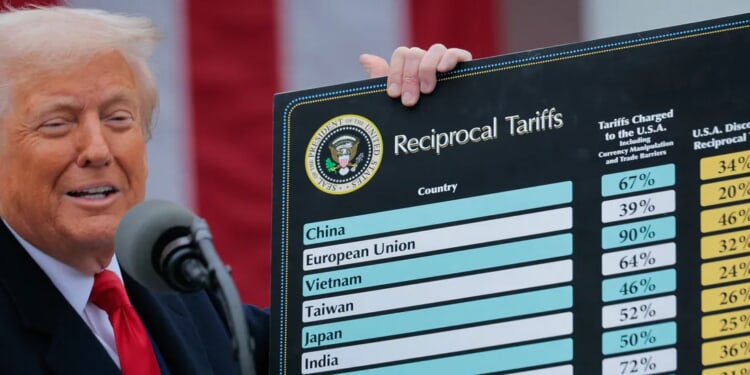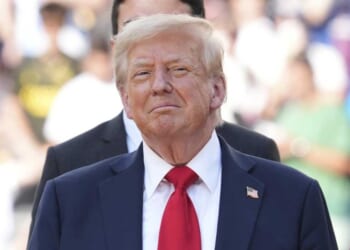The Supreme Court will consider a major challenge on Wednesday to President Donald Trump’s sweeping tariffs brought by several small businesses.
Under the International Emergency Economic Powers Act (IEEPA), the president has the power to “regulate, direct and compel…importation” during a national emergency, which Trump claims enables him to impose tariffs. Small businesses argue that this statute does not give the president taxing authority.
Trump cited two emergencies to impose tariffs, the fentanyl crisis for a first set of tariffs on Canada, China and Mexico in February and a growing trade deficit for a second set in April. The second set, known as the “Liberation Day” tariffs, imposed a baseline 10% tariff on imports, with increasing rates depending on the country.
“Until now, no President in IEEPA’s nearly 50-year history has ever invoked it to impose tariffs—let alone the sweeping worldwide tariffs imposed pursuant to the executive orders challenged here,” two small educational product businesses challenging the tariffs argued in a brief.
“The imposition of tariffs is a distinctly legislative power that the Constitution assigns exclusively to Congress,” the companies wrote. “The Framers believed it essential to vest the power to tax and tariff in Congress to guard against the threat of despotism.”
Pacific Legal Foundation senior attorney Oliver Dunford told the DCNF there “are a number of statutes on the books that allow the President to alter tariffs, but they include more substantive and procedural limits.”
“For example, Section 301 of the Trade Act of 1974 allow[s] the President to direct the U.S. Trade Representative to respond to unfair trade practices — but only after the Trade Representative completes various steps, including an investigation and providing an opportunity for public comment,” he said.
‘Exceed The Authority’
The two cases coming before the court on Wednesday, Learning Resources v. Trump and V.O.S. Selections v. Trump, involve small businesses impacted by the tariffs. Both sued the Trump administration in April, Learning Resources in the U.S. District Court of the District of Columbia and V.O.S. Selections in the U.S. Court of International Trade (CIT).
The government argues the district court was the wrong venue to hear the case because the CIT has exclusive jurisdiction over legal action related to tariffs.
The Federal Circuit Court of Appeals held 7-4 in August that IEEPA does not allow the tariffs Trump imposed, affirming a lower court’s decision from May
“We affirm the CIT’s [United States Court of International Trade] holding that the Trafficking and Reciprocal Tariffs imposed by the Challenged Executive Orders exceed the authority delegated to the President by IEEPA’s text,” the court held in V.O.S. Selections.
During oral arguments, the justices will hear from Solicitor General D. John Sauer, representing the government; Oregon Solicitor General Benjamin Gutman, representing states that challenged the tariffs; and Obama’s former acting solicitor general Neal Katyal, representing the small businesses.
Trump initially suggested that he might attend oral arguments, which would have made him the first sitting president to do so, but decided against it to avoid distracting “from the importance of this Decision.”
“It will be, in my opinion, one of the most important and consequential Decisions ever made by the United States Supreme Court,” Trump wrote Sunday on Truth Social. “If we win, we will be the Richest, Most Secure Country anywhere in the World, BY FAR. If we lose, our Country could be reduced to almost Third World status.”
Tariffs are the administration’s “most significant economic and foreign-policy initiative,” according to the government’s brief.
“The President and his Cabinet officials have determined that the tariffs are promoting peace and unprecedented economic prosperity, and that the denial of tariff authority would expose our nation to trade retaliation without effective defenses and thrust America back to the brink of economic catastrophe,” the administration argued.
Yet it’s possible that the Supreme Court’s ruling could “have less of an effect than it seems,” according to American Enterprise Institute senior fellow Adam White.
“Even if the administration cannot invoke IEEPA for future tariffs, it could try to rely on the (albeit more limited) Section 301 tariff statute and other laws,” White wrote Monday for SCOTUSblog. “Or, more bluntly, Trump could continue tariff negotiations without explicit reference to any statute, and frame the countries’ agreements as “voluntary” payments to the United States.”
‘Existential Threat’
Over 700 small businesses, under the name We Pay the Tariffs, filed an amicus brief arguing the tariffs “pose an existential threat to survival.”
“Far from strengthening the economy, the IEEPA Tariffs have halted expansion, siphoned off profits, caused job losses, increased consumer prices and even shuttered businesses,” they told the Court.
California, which sued Trump over his tariffs in April, argued in an amicus brief that the president’s actions are “of such vast significance that the President cannot undertake them without clear authorization from Congress.”
“The unprecedented tariffs imposed by the executive orders at issue in these cases threaten to devastate California’s economy, depriving it of $25 billion and more than 64,000 jobs,” the brief states.
A district judge ruled California’s lawsuit belonged in the CIT in June.
Other states challenging the tariffs, which include Colorado, Connecticut, Delaware, Illinois, Maine, Minnesota, Nevada, New Mexico, New York and Vermont, also argued that the court should “reject the President’s bid to seize” power reserved for Congress.
Meanwhile, Treasury Secretary Scott Bessent warned that the longer a ruling is delayed, the “greater the risk of economic disruption.”
“For example, delaying a ruling until June 2026 could result in a scenario in which $750 billion-$1 trillion in tariffs have already been collected, and unwinding them could cause significant disruption,” he wrote in a September declaration filed with the court.
Dunford told the DCNF that “the law is clear that improper tariffs must be refunded.”
“The question, therefore, is whether the courts will find an excuse — such as manageability — to preclude full refunds,” he said.
All content created by the Daily Caller News Foundation, an independent and nonpartisan newswire service, is available without charge to any legitimate news publisher that can provide a large audience. All republished articles must include our logo, our reporter’s byline and their DCNF affiliation. For any questions about our guidelines or partnering with us, please contact licensing@dailycallernewsfoundation.org.








![Trump, Hegseth to Get Troops Paid Despite Dems Voting Against it Eight Times [WATCH]](https://www.right2024.com/wp-content/uploads/2025/10/Trump-Hegseth-to-Get-Troops-Paid-Despite-Dems-Voting-Against-350x250.jpg)
![Keith Ellison Caught Promising to Fight State Agencies for Somali Fraudsters [WATCH]](https://www.right2024.com/wp-content/uploads/2026/01/Keith-Ellison-Caught-Promising-to-Fight-State-Agencies-for-Somali-350x250.jpg)







